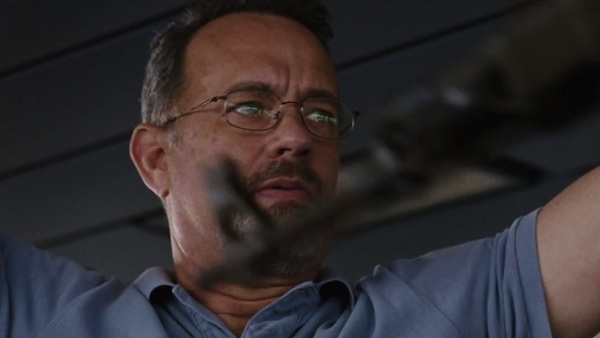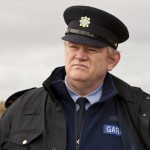Captain Phillips Review
Posted on October 13, 2013 By John Gilpatrick 2013, Movie Reviews, New Releases
Movie magic happens when the right actor finds the right director. Jimmy Stewart was the perfect everyman to navigate the twisted worlds of Alfred Hitchcock’s thrillers. In Robert De Niro, Martin Scorsese found the ideal actor to bring his tough Italian leading men to the big screen. The list goes on and on—Woody Allen and Diane Keaton, the Coens and John Goodman, and more recently, Tarantino and Christoph Waltz.
Add Tom Hanks and Paul Greengrass to the list. It’s an odd pairing, of course. The great humanist actor of his generation meets the man behind some of the most clinical and calculating dramas of the past decade—The Bourne Supremacy, The Bourne Ultimatum, Green Zone, and especially United 93. But the end result—the taut high-seas thriller Captain Phillips—is hard to argue with. Hanks hasn’t been this good in 20 years, and Greengrass’ approach feels revitalized with real people and their beating hearts driving the action.
Captain Phillips is based on the true story of Richard Phillips (Hanks) who survived an attack by armed pirates on the container ship Maersk Alabama in 2009. Phillips and his crew of 20 or so were headed for Kenya from Oman when two small boats approached off the coast of Somalia. Phillips’ craftiness disabled one and forced the other to turn around, but the next day, four young Somali men—led by Muse (Barkhad Abdi)—boarded the ship and demanded they get paid.
The rest of the film is a series of escalating cat-and-mouse games—the crew captures a pirate, the pirates escape in a lifeboat with Captain Phillips, the US navy traps the lifeboat. The whole thing is a story most are quite familiar with, so authentic suspense is hard to come by. Like Ben Affleck did with Argo, however, Greengrass milks tension out of nearly every frame. Because you care about Phillips—because Hanks so easily slips into the persona of John Q. Public—you’ll find yourself on the edge of your seat throughout the film’s intense but surprisingly breezy two hours.
What’s remarkable about Hanks’ performance is how unique it is within his incredibly impressive filmography. He seems like a natural fit for the character, but what we see on screen isn’t your average charming Hanks turn. This Phillips is a Greengrass creation—low-key and no-nonsense. Glimpses of humanity don’t really come out until after the halfway point, when he’s stuck on the lifeboat. But in the film’s final 15 minutes, any preconceptions we had about the character (and about Hanks as an actor, really) crash and burn in a series of increasingly heartbreaking moments.
Hanks’ performance is nearly matched—if not in number of big moments than certainly in overall quality—by that of newcomer Barkhad Abdi. His Muse gives the film subtext that raises it above your average procedural or heroic thriller. He proclaims himself a businessman to Captain Phillips upon their meeting. He also labels himself a simple fisherman to navy negotiators. No one is really buying what this guy is selling, and he too knows it’s mostly bullshit. But when Phillips tells him there must be something else he can do besides hijack ships at gunpoint for a living, he answers plainly, “Maybe in America.” In that moment, these two opponents understand each other, and we come closer to understanding Muse. Abdi walks such a fine line between unequivocally villainous and tragic/sympathetic without really falling 100% on either side of the line. It’s a thing of beauty to watch, and all the more impressive coming from a first-time actor.
Billy Ray (of Shattered Glass and Breach fame) penned Captain Phillips’ economic screenplay, and Christopher Rouse damn near edits it to perfection. Henry Jackman’s score gets your blood pumping without ever feeling overly intrusive, and Barry Ackroyd’s cinemtographic contributions can’t be understated—the sense of scale he gives the film by choosing the right angles and shot distances is essential.
Captain Phillips opens with as simple a scene as you’ll find in a movie this year—a husband and wife (Catherine Keener) drive to the airport. They discuss their children’s lives, their fears for the future, and before departing, she wishes him a safe trip. It seems so unremarkable, but it is the film. It’s Phillips’ motivation to endure. It’s Ray’s first tension-filled stroke of the pen. It’s a way to orient yourself to Greengrass’ seemingly patented handheld, close-up style. It’s the first taste we get of the film’s “economies of scale” themes.
And it’s our introduction to our hero as an ordinary guy, which is ultimately what I’ll remember Captain Phillips for the most—for Hanks’ towering performance and for the way Greengrass and company, through images and sound, made me feel his plight.
2013, 3.5 Stars, Barkhad Abdi, Barkhad Abdirahman, Barry Ackroyd, Billy Ray, Captain Phillips, Catherine Keener, Christopher Rouse, Faysal Ahmed, Henry Jackman, Mahat M. Ali, Michael Chernus, Paul Greengrass, Tom Hanks

















Pingback: Reviews: Captain Phillips (2013) | Online Film Critics Society